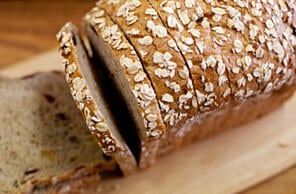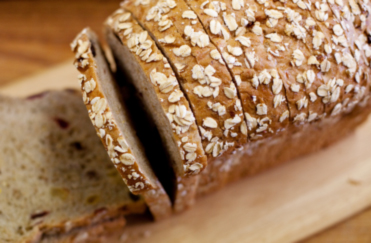Whether you are an athlete or you are just working out to stay fit and healthy, carbohydrates play a very important role. They provide you energy so you can “save” the protein you are eating to build more muscle and prevents your existing muscles from being broken down for energy. This is called ‘protein sparing.’

So eating carbohydrates not only allows for you to push yourself harder in a workout by providing your fuel, but also allows for greater increases in muscle mass. Muscle mass is metabolic tissue so it actually burns calories -- even when not being exerted -- increasing your metabolism.
Carbohydrates also have other roles in the body beyond providing energy, such as binding to proteins to form new molecules. The resulting glycoproteins play a role in maintaining a healthy mucosa and lining in the stomach, connective tissue (such as collagen), and even in the formation of bone. Glycoproteins may also play a role in nerve and brain function. These are just some of the many functions carbohydrates have in the body.
So what benefits do carbohydrates offer?
-
They offer a wide array of vitamins and minerals including folic acid which prevents neural tube defects in infants
-
Their own specific set of cancer and disease fighting phytochemicals and antioxidants
-
Source of fiber
-
Source of lignans (a phytonutrient that may promote heart health and healthy immune function- found in whole wheat, barley, oats, rye, flax seed, fruits, and vegetables)
-
Diets rich in unrefined carbohydrates (e.g., whole grains) are also linked to reduction in many chronic diseases including cardiovascular disease, cancer, diabetes, and gastrointestinal disorders.
What fits into the carbohydrate category?
-
Milk and dairy products- provide calcium for bone health.
-
Fruits- provide fiber, antioxidants and wide array of nutrients

-
Starchy Vegetables- provide fiber, antioxidants and a wide array of nutrients
-
Beans and Legumes- provide fiber, micronutrients, and antioxidants

-
Whole Grains- provides phytochemicals, antioxidants, fiber, lignans and a wide array of nutrients

-
Carbohydrates also include some not so good for you foods -- candy, refined grains, sweetened beverages, sweets, added sugars, cookies, cakes, etc.
Carbohydrates and metabolism. When food is eaten, it is broken down during digestion into its smallest form so it can be used in the body. Carbohydrates are broken down to one of the simplest forms of sugar called glucose. A healthy reaction to eating carbohydrate is a rise in blood glucose which then causes insulin to be released. The insulin acts as a key to open up cells to:
1) use glucose as an immediate source of energy, or
2) be stored in the muscles and liver, or
3) be stored as fat if more energy is consumed than can be burned or stored in the muscles and liver.
Because insulin release is triggered by carbohydrate intake and insulin promotes the storage of glucose as fat (see #3 above), many assume that if you cut out carbohydrates you minimize insulin release and thus avoid fat storage.
It can then be theorized that carbohydrates and insulin are the cause of fat, but this is not what happens in the body. Regardless of the source or the need for insulin, excess calories will be the cause of weight gain…not the insulin.
If one consumes more calories than they burn and it was all from fat –which would almost entirely eliminate insulin release—weight would still be gained just as if the same amount of calories were consumed from carbohydrates.
What are your favorite carbs for fueling your day?
References:
-
Academy of Nutrition and Dietetics Evidence Analysis Library. Adult Weight Management: Managing and losing weight the healthy way. Academy of Nutrition and Dietetics. 2012; 7-8.
-
Agriculture Fact Book 2001-2002. Washington, D.C.: U.S. Dept. of Agriculture, 2003. 14-21. Agricultural Fact Book. USDA, Mar. 2003. Web. July 2013.
-
"Dietary Reference Intakes Tables and Application." Dietary Reference Intakes Tables and Application. Institute of Medicine, 21 Sept. 2011. Web. 23 July 2013.
-
"Dietary Protein and Chronic Kidney Disease." Diet Basics. N.p., n.d. Web. 23 July 2013. <http://www.davita.com/kidney-disease/diet-and-nutrition/diet-basics/dietary-protein-and-chronic-kidney-disease/e/5302>.
-
Duyff RL. American Dietetic Association Complete Food and Nutrition Guide. 3rd ed. Hoboken, N.J.: John Wiley & Sons; 2006. 47-48, 113-125. Print.
-
Gropper, Sareen Annora Stepnick., Jack L. Smith, and James L. Groff. Advanced Nutrition and Human Metabolism. 4th ed. Belmont (Calif.) [etc.: Wadsworth/Thomson, 2005. Print.
-
"Low-carb Diet: Can It Help You Lose Weight?" Mayo Clinic. Mayo Foundation for Medical Education and Research, 11 Oct. 2011. Web. 23 July 2013.
-
McKeown N, Troy L, Jacques P, Hoffmann U, O’Donnell C, Fox C. Whole and refined grain intakes are differentially associated with abdominal visceral and subcutaneous adiposity in healthy adult: the Framingham Heart Study. Am J Clin Nutr 2010; 92:1165-1171.
-
McKeown N, Yoshida M, Shea M, Jacques P, Lichtenstein A, Rogers G, Booth S, Saltzman E. Whole Grain Intake and Cereal Fiber Are Associated with Lower Abdominal Adiposity in Older Adults. J. Nutr. 2009; 139: 1950-1955.
-
Merchang A, Vatanparast H, Barlas S, Dehghan M, Shah S, Koning L, Steck S. Carbohydrate Intake and Overweight and Obesity among Healthy Adults. J Am Diet Assoc. 2009; 109:1165-1172.
-
Sizer, Frances Sienkiewicz., and Eleanor Noss. Whitney. Nutrition: Concepts and Controversies. 12th ed. Belmont, CA: Wadsworth Cengage Learning, 2012. 143-48. Print.
Photo credits:
Fruit bowl: Darwin Bell via photopin cc





